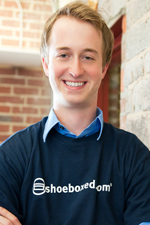Hi Tim, and welcome on board. Tell us a few things about yourself.
Tim: I founded www.clearbooks.co.uk in July 2008. It’s an online accounting application for small businesses that is revolutionising the accounting software industry. Apart from that, I’m an ordinary guy. I went to university, got a graduate job, and then ventured out with my start-up.
So you have an online business, tell us more about it.
Tim: www.clearbooks.co.uk is online accounting software with a simple goal: to free your time. Businesses are required to maintain accounting records, and www.clearbooks.co.uk helps them do that.
How does it work exactly? What is the workflow?
Tim: Accounting is inherently complicated. Our goal is to make accounting for small businesses clear and simple. You can be creating your first invoice in minutes. Business owners don’t want to waste time on bookkeeping. They want to run their business and generate revenue instead, and that is what we help them do.
Probably it works best for small businesses? What is your target customer?
Tim: Our target market is a small business, and we currently have 1,200 subscribed to the system. They range from one-man bands, startups, freelancers, and sole traders right up to multi-million-pound companies with 20+ employees. The ability to toggle on advanced features, such as Payroll, provides the necessary power required by larger companies.
Can it be used outside the UK?
Tim: Clear Books has customers in the US, Canada, France, Tunisia, India, China, South Africa, and Germany, to name a few. The ability to set custom tax rates and our multi-currency reporting means that businesses around the world are able to use the system.
What are the most important benefits?
Tim: It’s easy to use, saves time, saves money, helps you analyze your business more efficiently, and has a fantastic business community.
Aren’t people afraid to keep their private information online? How secure is the system?
Tim: Security is our top priority. We have a dedicated service center on-site at our partner company, Fubar. This allows us to monitor all aspects of security extremely closely.
And how much does it cost?
Tim: Pricing is very competitive with plans at £5 / £10 / £15 per month depending on the size of your business.
How did you come up with the idea?
Tim: Outside of my day job, I had developed a simple web-based double-entry accounting system to maintain the accounts for a small web development company I ran in my spare time. A good friend of mine, who is a director at Fubra, had developed an invoicing system for his brother’s construction business. When we realised we were working on complementary projects, the idea to merge them was a no-brainer.
What was the exact process from having the idea to say, writing the first line of code?
Tim: At the time, I was still in full-time work. To concentrate fully on merging the two projects Fubra and I decided to form a new joint venture which gave me the opportunity to quit my job and focus my efforts fully on www.clearbooks.co.uk.
Did you make a business plan before, surveyed the market to see if the need for such an online service could have enough potential paying customers to sustain a business?
Tim: We knew that at least 3 businesses would use the application: My small web development company, the construction business, and Fubar. Our goal was to establish an app that worked for these three businesses. If we could do that, then we knew it would work for any small business.
When we first started, we thought we had hit on a fantastic idea that no one else had thought of. We soon noticed a few online accounting competitors; however, as our industry was in its infancy, there have been plenty of room for us to make our mark.
My own experience says that as soon as you have a business idea, you try to get the opinion of the family and close friends to see if it’s holding water. Was it the same in your case, and if it did, how did it go?
Tim: Quitting my job to pursue an idea was a risk. However, the idea was a good one that made the difference. I’ve pursued lots of ideas in the past, but this was the one idea that my (very sensible) partner agreed might actually work. That was the green light to collect my P45.
A lot of entrepreneurs bootstrap their start-up – don’t have a lot of money to invest and put a lot of personal work in the new business. How do you know when it’s time to hire?
Tim: For the first year and a half, I developed Clear Books from the spare room to keep costs down to a minimum. The reason we moved into our first office was that the need to hire arose and therefore somewhere was needed to accommodate our first employee.
The time was right because we had to pay customers and could afford to hire. That is important.
You know the need to hire someone when your development time is getting impacted by other considerations such as supporting customers and marketing the website.
Coming back to the service, what makes it unique?
Tim: Our service makes us unique. We interact heavily with our users on our customer satisfaction site, which is invaluable for gaining feedback and iterating over the code to improve existing features. We love our customers, and they love us. We set up www.weloveclearbooks.com to show this.
What are the most time-saving features of the platform?
Tim: Compared to dinosaur accounting systems like Sage which are typically installed on only one desktop, the time saving really kicks in due to the flexibility of being online. You have flexible access and can dip in and out of the accounts as you need from anywhere rather than only at one computer.
There are lots of features we have in the system that aim to save time, such as direct VAT filing to HMRC, automatic chasing of late payers, recurring invoices, a super-fast bank import tool, but most important is the simple layout and design which makes the system easy to navigate.
How did you feel when you got your first customer?
Tim: Knowing that someone is willing to pay for a service you have created is pretty special. In our first month out of beta, we ran a promotion and converted about 50 users into customers. It’s a small number now, but at the time, it felt huge.
A big fear for startups is no one will buy your product. As soon as possible, you should stick a price on your product and see what happens!
You told me you have a very special deal for start-up businesses, what is it?
Tim: It takes time and dedication for startups to establish their business. This is why Clear Books offers completely free accounting software to these businesses for as long as they remain small. Startups will typically process only a few transactions per month, and Clear Books will remain free during this time.
We also offer all businesses a 30 day free trial of www.clearbooks.co.uk. It’s essential for SMEs and start-ups to explore software for their business before they buy. We encourage companies to sign up for a free trial so that they can experience Clear books and make a decision based upon this.
Talking about start-ups, what would you do differently if you were to start all over again?
Tim: We made some mistakes using freelancers on a couple of projects. If you are building an application that is going to need updating and extending, then it makes sense to do it all in-house.
Did you have thoughts about failure along the way? How should an entrepreneur deal with the fear of failure?
Tim: I had always envisaged running my own company, and that is part of the reason I trained as a Chartered Accountant at KPMG. I wanted a backup career I could fall back on (the other reason is I wanted the business grounding). For me, failure wasn’t really on the agenda. I knew we had a good idea, I knew I had the mix of skills to develop the system, and I am a motivated person. I was also in partnership with an established company to which I could always turn for help.
As long as you have a great idea, ability, and desire, then you will succeed.
Was there a tipping point when you realized you are on the right track?
Tim: There have been various rewarding milestones along the way. The first customer, moving into an office, being able to afford and take on your first employee, but reaching 1,000 customers was the milestone that felt like we had traction.
Any advice for start-ups regarding the accounting process?
Tim: If you don’t keep on top of your finances, then accounting can become an administrative nightmare. Start as you mean to go on and get organised with a good accounting application that works for you. With a good system, you can produce smart invoices to look professional, and you can automatically chase late payers who will help your cash flow.




